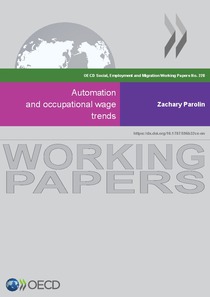Automation and occupational wage trends
"Routine-biased technological change has emerged as a leading explanation for the differential wage growth of routine occupations, such as manufacturers or office clerks, relative to less routine occupations. Less clear, however, is how the effects of technological advancement on occupational w...
| Main Author: | |
|---|---|
| Institution: | ETUI-European Trade Union Institute |
| Format: | TEXT |
| Language: | English |
| Published: |
Paris
2019
OECD |
| Subjects: | |
| Online Access: | https://www.labourline.org/KENTIKA-19135355124919535379-automation-and-occupational-wa.htm |
| _version_ | 1771659902129799169 |
|---|---|
| author | Parolin, Zachary |
| author_facet | Parolin, Zachary |
| collection | Library items |
| description | "Routine-biased technological change has emerged as a leading explanation for the differential wage growth of routine occupations, such as manufacturers or office clerks, relative to less routine occupations. Less clear, however, is how the effects of technological advancement on occupational wage trends vary across political-institutional context. This paper investigates the extent to which collective bargaining agreements and union coverage shape the relative wage growth of automatable occupations. Using data from the Luxembourg Income Study and the United States Current Population Survey, I measure the ‘routine task intensity’ of occupations across 15 OECD Member States and the 50 United States from the 1980s onward. Findings suggest that bargaining coverage is more consequential for the wage growth of high routine occupations relative to less routine occupations, and that high routine occupations lose coverage at a faster rate when bargaining coverage at the national level declines. As a result, declines in bargaining coverage within a country are associated with declining relative wage growth for automatable occupations. Estimates suggest that had union coverage in the United States not declined from 1984 levels, the earnings of high routine occupations might have grown at the same rate as low pay occupations between 1984 and 2015, rather than experiencing a relative wage decline. However, the findings also suggest that gains in the relative wage growth may increasingly come at the cost of reduced employment shares of automatable occupations." |
| format | TEXT |
| geographic | OECD countries |
| id | 19135355124919535379_b04d29f9f7fa43b2bcb80514f704b8ea |
| institution | ETUI-European Trade Union Institute |
| is_hierarchy_id | 19135355124919535379_b04d29f9f7fa43b2bcb80514f704b8ea |
| is_hierarchy_title | Automation and occupational wage trends |
| language | English |
| physical | 48 p. Digital |
| publishDate | 2019 |
| publisher | Paris OECD |
| spellingShingle | Parolin, Zachary automation repetitive work technological change wages collective bargaining trade union attitude Automation and occupational wage trends |
| thumbnail | https://www.labourline.org/Image_prev.jpg?Archive=139040295722 |
| title | Automation and occupational wage trends |
| topic | automation repetitive work technological change wages collective bargaining trade union attitude |
| url | https://www.labourline.org/KENTIKA-19135355124919535379-automation-and-occupational-wa.htm |

